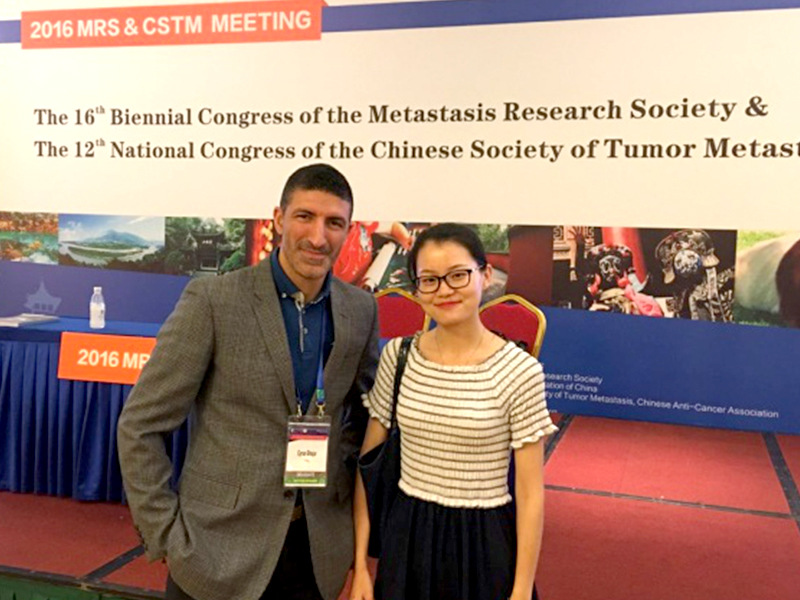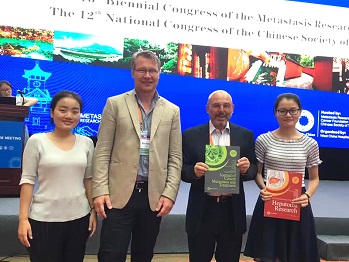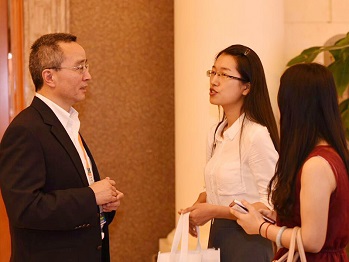The Harvest and Growth of JCMT on the 16th Biennial Congress of the Metastasis Research Society
The 16th Biennial Congress of the Metastasis Research Society (MRS) and the 12th National Congress of the Chinese Society of Tumor Metastasis was held on September 15, 2016, in Chengdu, China. The assistant editors (Lisa Huang, Emma Yang, and Lily Wang) of the Journal of Cancer Metastasis and Treatment (JCMT) and Dan-dan Yu, the publication manager of OAE Publishing Inc. took part in the conference, to learn the latest news and development trends of cancer metastasis and promote JCMT in the international conference.
MRS aims to provide an international communication platform for cancer researchers, clinicians, researchers, and practitioners in the pharmaceutical industry, to help better promote the development of cancer metastasis research. More than 40 top international experts and scholars from United States, China, Japan, Australia, United Kingdom, Germany, Italy, and Canada attended the four-day academic fest. The 11 themes discussed showed the latest development of cancer metastasis-"Heterogeneity and metastatic evolution," "EMT, CSC and plasticity," "Non-coding RNAs and chromatin regulators in metastasis," "Dormancy and DTCs," "Panel discussion: Liquid Biopsy: Circulating tumor cells vs. Circulating tumor DNA," "Aging and therapy induced metastasis," "Stress, inflammation, and immune regulation of metastasis," "Advanced imaging in metastasis research and treatment," "Immunotherapy, targeted therapies and drug development," "Exosomes and other vesicles in metastasis," and "Metastasis organotropism". Prof. Joan Massague gave a lecture on "Latency, Immune Evasion, and Outbreak of Metastatic Stem Cells," Prof. Klaus Pantel talked about the theme of "Liquid Biopsy: Blood-based detection and characterization of circulating tumor cells and circulating nucleic acids." Prof. David R. Piwnica-Worms gave a lecture about "Illuminating Cancer Systems with Imaging Reporters: p53 deficiency and metastatic potential in PDX models of triple negative breast." Prof. Dario Marchetti carried out research on the evolution of breast cancer circulating tumor cells mediating brain metastasis.

Dan-dan Yu and Prof. Cyrus Ghajar
Through listening to the experts' professional reports, our editorial staff learned about the latest research results and the direction of cancer metastasis. Besides, the editorial staff actively consulted professors on how to balance subject hotspots and basic research during the development process of a journal, and how to serve specialists and readers better. Experts warmly communicated with editors and suggested that they seize the most interesting fields/topics to attract readers firstly based on professional points of view and then, their own experience. They also said that high-quality articles were the soul of journal development, even if the content was not focused on the most interesting and upcoming fields. Prof. Cyrus Ghajar pointed out that the Impact Factor (IF) was not what researchers cared about most, but what counts is how many readers a journal has and what services the journal can provide. Many journals with low IFs or no IF at all had a wide range of readership and the majority of scientists identified with them. The experts’ thoughtful answers not only benefitted editors but also gave a focused direction for the journal.
Furthermore, editors introduced the development of JCMT since its inception in April 2015, involving the editorial board, quality of manuscripts, readership, journal features, etc. Specialists, notably Prof. Peter Friedl, Prof. David R. Piwnica-Worms, and Prof. Andreas Evdokiou, affirmed the development of our journal and expressed great expectations. They also patiently answered questions about the source of manuscripts and development direction and gave professional and honest advice.

Lisa Huang, Prof. Klaus Pantel, Prof. Jean Paul Thiery, and Dandan Yu (left to right)

Prof. Zhi Wang, Emma Yang, and Lily Wang (left to right)
Through this conference, we are clearer about our responsibility and goals. In addition, it confirms that our policy of always adhering to high quality is correct. We will work harder in the future, have real-time communication with international experts, and carry out every job seriously to sure high quality. We aim to serve researchers truly, promoting the development of key disciplines in key areas.


